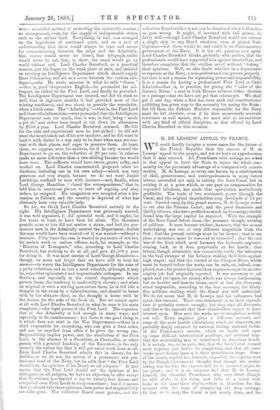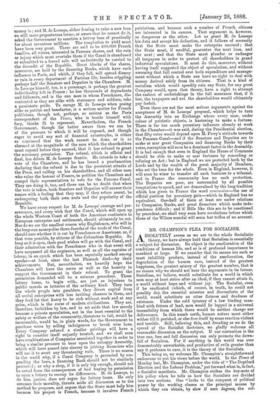M. DE l i ESSEPS' APPEAL TO FRANCE.
WE could hardly imagine a worse omen for the future of the French Republic than the success of M. de Lesseps' appeal to the people, and yet we have an apprehension that it may succeed. All Frenchmen with savings are asked in that appeal to force the State to injure the whole com- munity for the pecuniary advantage of a comparatively minute section. M. de Lesseps, as every one knows, by a combination of skill, perseverance, and unscrupulousness in using forced labour, succeeded not only in cutting the Suez Canal, but in cutting it at a price which, as one pays no compensation for expended fellaheen, has made that speculation marvellously profitable. The trade of two continents passes through the Canal, and the original shareholders reap dividends of 15 per cent. Carried away by this grand success, M. de Lesseps vowed to out also the Panama Canal; and the great financiers and thrifty citizens, who have profited so much by his energy, readily found him the large capital he required. With the example of the Suez Canal before them, the peasants thought nothing of millions. It soon became evident, however, that the second undertaking was one of very different magnitude from the first ; that the general cuttings must be far deeper ; that in one place a mountain must be removed or tunnelled ; that the soil was of the kind which most harasses the hydraulic engineer, coming back, as it does, perpetually on his hands ; that labour, though obtainable, was excessively costly, the labourers in the foul swamps of the Isthmus staking their lives against high wages ; and that the control of the Chagres River, which must be turned before the works can be safe, or, indeed, com- pleted, was a far greater business than engineers eager for another mighty job had originally reported. It was necessary to ask again and yet again for money, which was always forthcoming, but on heavier and heavier terms, until at last the Company stood responsible, according to the best accounts, for thirty- five millions sterling, while the Canal was still unfinished. We do not mean that M. de Lesseps and his colleagues had spent this amount. Their own statement as to their expendi- ture is probably correct enough ; but they omit all discounts, and this is the amount that their shareholders expect to have interest upon. How near the works are to completion nobody can tell. Every engineer gives a different account, and some of the most hostile calculations, which are American, are probably deeply coloured by national feeling, national dislike of the Frenchman's success, which no doubt will open up some difficult international problems, and national hope that the undertaking may be transferred to American hands. It is certain, too, to be quite fair, that the Suez Canal seemed most hopeless just before its completion, and that all canal works most dismay laymen in their penultimate stage. Some of the hostile reports are, however, impartial; the reporter sent by the French Government thought that though the under- taking was feasible, the expense still to be incurred might be too great ; and it is an ominous fact that M. de Lesseps himself, the cheeriest Frenchman who ever lived, though he still sticks to his dates, now talks of a canal with locks as his immediate object,—that is, abandons for the moment even the hope of completing his deep cuttings. Be that as it may, the Canal is not nearly done, and the money is ; and M. de Lesseps, either fearing to raise a new loan on still more preposterous terms, or aware that he cannot do it, asked the Government to sanction a lottery loan of practically for about seventeen millions. The temptation to yield must have been very great. There are said to be 400,000 French families, all voters, interested in Panama shares, and the ruin or injury which must overtake them if the Canal is abandoned or submitted to a forced sale, will undoubtedly be carried to the discredit of the Republic. Great blocks of the shares, moreover, are held by the financing Banks, which have such 'influence in Paris, and which, if they fall, will spread dismay or ruin in every department of Parisian life, besides crippling perhaps half the Senators and Deputies in the Chambers. M. .de Lesseps himself, too, is a personage, is perhaps the greatest individuality left in France ; he has thousands of dependants and followers, and is the one man in whom Frenchmen, dis- contented as they are alike with statesmen and soldiers, take o. passionate pride. To enrage M. de Lesseps when posing alike as patriot and benefactor, is a serious matter for French politicians, though not, perhaps, so serious as the Paris correspondent of the Times, who is beside himself with fury, thinks fit to represent. Nevertheless, the French flovernment, though far better aware than we can be of the pressure to which it will be exposed, and though eager to avoid any sort of financial catastrophe, is either so convinced that the work cannot be done, or is so alarmed at the magnitude of the sum which the shareholders 'must expend before they succeed, that it has refused to grant use necessary permission. The refusal, which is official and final, has driven M. de Lesseps frantic. He intends to take a vote of the Chambers, and he has issued a proclamation declaring that the refusal is due to the persistent attacks of the Press, and calling on his shareholders, and all other men who value the honour of France, to petition the Chambers and compel their representatives to vote for the Panama Canal. They are doing it, too, and there can be no doubt that when the vote is taken, both Senators and Deputies will answer their names with a feeling that they may, if they refuse assent, be endangering both their own seats and the popularity of the Republic. We have every respect for M. de Lesseps' courage and per- severance, and every wish that the Canal, which will open up the whole Western Coast of both the American continents to European enterprise and settlement, should ultimately be cut. Nor do we see the smallest reason why Englishmen, who will in the long-run monopolise three-fourths of the trade of the Canal, should care whether it is cut by Frenchmen or Americans, or, if -that were possible, by citizens of the Columbian Republic. So long as it is open, their good wishes will go with the Canal, and their admiration with the Frenchman who in that event will have surpassed all the engineers, as well as all the captains of 'labour, in an epoch which has been especially marked among epochs—at least, since the last Pharaoh died—by their achievements. But, nevertheless, we heartily hope the Chambers will have the nerve as well as the honesty to -support the Government in their refusal. To grant the -permission demanded will be a ruinous precedent. These lottery loans, to begin with, are just as injurious to .public morals as lotteries of the ordinary kind. They turn the whole people into gamblers, they divert capital from all useful enterprises with less inviting chances in them, and they feed fat that hurry to be rich without work and at any price, which is the curse of modern civilisations. They are, therefore, forbidden by law, and to set aside that law merely because a private speculation, not in the least essential to the safety or welfare of the community, threatens to fail, would be inexcusable, would be, in plain words, for the Government to purchase votes by selling indulgences to break wise laws. Every Company refused a similar privilege will have a right to consider itself unjustly treated, and we shall soon have combinations of Companies associated together in order to bring a similar pressure to bear upon the unhappy Assembly, which will have passed into slavery to jobbing financiers who will use it to avert any threatening ruin. There is no reason in the world why, if a Canal Company is protected by sus- pending the laws, a financing Bank should not be similarly protected ; or why a shop, if it is only big enough, should not be saved from the consequences of bad buying by permission to open a lottery to recoup its differences. M. de Lesseps, to do him justice, does not argue for lottery loans. He only assumes their morality, thrusts aside all discussion as to the method he proposes, and argues that the State must help him because his project is French, because it involves French
patriotism, and because such a number of French citizens are interested in its success. That argument is, however, as dangerous as the other. Let us grant M. de Lesseps his data and accept his deduction, and it follows of necessity that the State must make the enterprise succeed ; that the State must, if needful, guarantee the next loan, and the next ; and that the State mast plunder or endanger all taxpayers in order to protect all shareholders in grand industrial speculations. It must do this, moreover, without having itself suggested the object of speculation, and without assuming that full control over both expenditure and manage- ment without which a State can have no right to deal with money derived solely from its citizens. That is a kind of socialism which would speedily ruin any State, for any great Company would, upon that theory, have a right to attempt the rashest of undertakings in the full assurance that, if it lost, the taxpayers and not the shareholders would ultimately pay forfeit.
Even these are not the most serious arguments against the acceptance of M. de Lesseps' proposal, which helps to turn the Assembly into an Exchange where every man, under colour of patriotic objects, is hastening to make a fortune. There is far too much pecuniary influence already at work in the Chamber—it was said, during the Presidential election, that fifty votes would depend upon M. Ferry's attitude towards the Panama Canal—and if the Senators and Deputies are to make or mar great Companies and financing Banks by their votes, corruption will soon be a dominant factor in the Assembly. It is bad enough that even in England the House of Commons
should be able to make or mar fortunes by conceding or refusing an Act ; but in England we are protected both by the Lords and by the wealth of the great majority of Members, who set the tone for the whole. Even in England, however, it will soon be wiser to transfer all such business to a tribunal, and in France the community has no such protection. The Deputies are poor, are surrounded by all possible temptations to spend, and are demoralised by the long tradition which has given to France the word concussion—the use of official position for pecuniary gain—which in England has no equivalent. One-half of them at least are under relations to Companies, Banks, and great financiers which make inde- pendence difficult ; and if Bills like this are to be sanctioned by precedent, we shall very soon have revelations before which those of the Wilson scandal will seem but trifles of no account.



















































 Previous page
Previous page